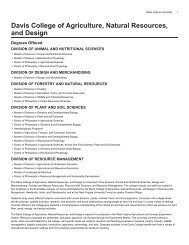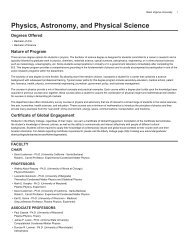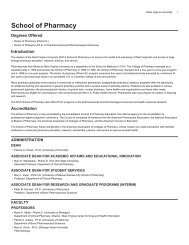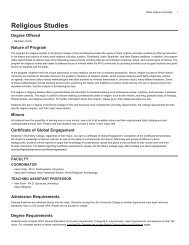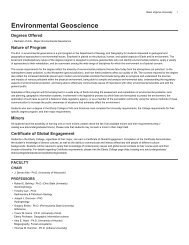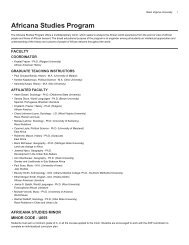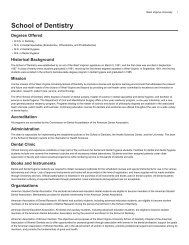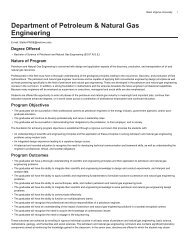- Page 1:
WEST VIRGINIA UNIVERSITYUndergradua
- Page 5 and 6:
FridayUNIVERSITY CALENDAR, 1991-92F
- Page 7 and 8:
ContentsPresident's Cabinet, Deans,
- Page 9 and 10:
WEST VIRGINIA UNIVERSITYPresident's
- Page 11 and 12:
BPart 1 General InformationWest Vir
- Page 13 and 14:
1climate is marked by four distinct
- Page 15 and 16:
Grade Averages and Test ScoresThe g
- Page 17 and 18:
of the semester in which you wish t
- Page 19 and 20:
assessed undergraduate fees. Candid
- Page 21 and 22:
College of Business and EconomicsAc
- Page 23 and 24:
.Academic Common MarketWest Virgini
- Page 25 and 26:
possess knowledge and experience in
- Page 27 and 28:
Music 30, 33, 34, 129, 136, 137, 13
- Page 29 and 30:
tia. The permission must be granted
- Page 31 and 32:
Advanced Placement ProgramSubject T
- Page 33 and 34:
college granting your degree and th
- Page 35 and 36:
At least 30 of the 80 hours must ha
- Page 37 and 38:
.GPA CalculationsStudents like to k
- Page 39 and 40:
.dean's recommendation, or if the s
- Page 41 and 42:
Re-Enrollment After WithdrawalAfter
- Page 43 and 44:
.Step 1 . The student shall discuss
- Page 45 and 46:
3.The administrative procedure is n
- Page 47 and 48:
.penalties imposed in Step 1 or for
- Page 49 and 50:
(If the applicant applies for admis
- Page 51 and 52:
$3,187.504,132.50 3,837.50 3,627.50
- Page 53 and 54:
Policy Regarding ResidencyClassific
- Page 55 and 56:
Section 9 AppealsAt a minimum, such
- Page 57 and 58:
ment. The study of ecology, then, i
- Page 59 and 60:
Division of Animal and Veterinary S
- Page 61 and 62:
16Examples of Suggested CurriculaTh
- Page 63 and 64:
Norman O. Olson, D.V.M. (Wash. St.
- Page 65 and 66:
Areas of EmphasisChild CareChild De
- Page 67 and 68:
a passing score on the Pre-Professi
- Page 69 and 70:
asic food service and restaurant ma
- Page 71 and 72:
Textiles, Clothing and Fashion Merc
- Page 73 and 74:
six week summer field practice; thi
- Page 75 and 76:
As a graduate professional forester
- Page 77 and 78:
,field work is required of students
- Page 79 and 80:
Associate ProfessorsJames P. Armstr
- Page 81 and 82:
state, and federal governmental age
- Page 83 and 84:
agricultural mechanization, with em
- Page 85 and 86:
Agriculture Teacher EducationAn eff
- Page 87 and 88:
FacultyAgricultural EconomicsProfes
- Page 89 and 90:
College of Arts and SciencesGerald
- Page 91 and 92:
Admission to Arts and Sciences Degr
- Page 93 and 94:
Japanese, Latin, Portuguese, Russia
- Page 95 and 96:
Art HistoryDegree: Bachelor of Arts
- Page 97 and 98:
Joseph A. Marshall, Ph.D. (U. Md.).
- Page 99 and 100:
120; E.C.E. 272; Engl. 208; Math. 1
- Page 101 and 102:
1Fourth YearFirst Semester Hr. Seco
- Page 103 and 104:
*Interpersonal and Organizational C
- Page 105 and 106:
The computer science major is inten
- Page 107 and 108:
Associate ProfessorsJohn M. Atkins,
- Page 109 and 110:
Economics majors are required to ha
- Page 111 and 112:
FacultyProfessorsSophia B. Blaydes,
- Page 113 and 114:
1operate. The Department of Foreign
- Page 115 and 116:
advanced levels. The elementary lev
- Page 117 and 118:
5 5Geology and GeographyDegreesGeog
- Page 119 and 120:
7previous paragraph. In exceptional
- Page 121 and 122:
9C. Blaine Cecil, Ph.D. (WVU). Adju
- Page 123 and 124:
W. Reynolds McLeod, Ph.D. (U. Md.).
- Page 125 and 126:
of courses in economics, foreign la
- Page 127 and 128:
To enroll in a freshman-level mathe
- Page 129 and 130:
Joy B. Easton, J.D. (WVU). Emerita.
- Page 131 and 132:
Pre-Law Track in PhilosophyPhibsoph
- Page 133 and 134:
Arnold D. Levine, Ph.D. (Columbia U
- Page 135 and 136:
—With the exception of the pre-la
- Page 137 and 138:
John A. Jacobsohn, Ph.D. (U. Md.).
- Page 139 and 140:
Katherine Karraker, Ph.D. (Mich. St
- Page 141 and 142:
also possible, if the student simul
- Page 143 and 144:
—their causation, definition, pre
- Page 145 and 146:
esearch team as a member who can de
- Page 147 and 148:
Assistant ProfessorsMagdalena Niewi
- Page 149 and 150:
Whether students intend to operate
- Page 151 and 152:
— —Labor-Management Research Ce
- Page 153 and 154:
designated by a "W" in the LSP sect
- Page 155 and 156:
economy such as households, busines
- Page 157 and 158:
the College of Business and Economi
- Page 159 and 160:
Recommended ElectivesStudents prepa
- Page 161 and 162:
—Econ. 54 and 55 Principles of Ec
- Page 163 and 164:
Elect IvesWith your career goals in
- Page 165 and 166:
Acctg. 216 Advanced Managerial Acco
- Page 167 and 168:
1Lutfus Sayeed, M.S. (Ga. St. U.).
- Page 169 and 170:
Comm. 1 1 1 Human CommunicationPsyc
- Page 171 and 172:
College of Creative ArtsMargaret O.
- Page 173 and 174:
—Audit, Credit by Examination, Pa
- Page 175 and 176:
HoursArt 200 Studio Major 24Art 100
- Page 177 and 178:
Second YearFirst Semester Hrs. Seco
- Page 179 and 180:
Fourth Year(The two senior semester
- Page 181 and 182:
can expect the greatest success. Ev
- Page 183 and 184:
Students who are admitted condition
- Page 185 and 186:
)Music Theory electives (2, 2)Gener
- Page 187 and 188:
Music 265 Analysis of Musical Form
- Page 189 and 190:
)Music 62, 64, 66 Written Theory (2
- Page 191 and 192:
)General Studies (47-48 Credits)Eng
- Page 193 and 194:
Music 151 Instrumental Mush Educati
- Page 195 and 196:
Instruments; Piano, Piano repertoir
- Page 197 and 198:
Teacher CertificationAlthough there
- Page 199 and 200:
Second YearFirst SemesterTheat. 106
- Page 201 and 202:
School of DentistryW. Robert Biddin
- Page 203 and 204:
College of EngineeringCurtis J. Tom
- Page 205 and 206:
Priorities for Admission to a Major
- Page 207 and 208:
decided, on a case-by-case basis, i
- Page 209 and 210:
FacultyProfessorsRichard C. Bailie,
- Page 211 and 212:
'Physics 1 1 may be delayed until t
- Page 213 and 214:
11The mathematics/statistics electi
- Page 215 and 216: 1repeated, only the hours credited
- Page 217 and 218: The industrial engineering program
- Page 219 and 220: 1graduate curriculum also allows th
- Page 221 and 222: Minimum Grade-Point Average Require
- Page 223 and 224: Victor Mucino, D.E. (U. Wise-Mil.).
- Page 225 and 226: levels; and to contribute to the in
- Page 227 and 228: PROGRAMS FOR UNDERGRADUATE SECONDAR
- Page 229 and 230: .• Present a minimum of 128 hours
- Page 231 and 232: Assistant ProfessorsMary Alice Bark
- Page 233 and 234: SPECIALIZATION FOR GRADES 5 THROUGH
- Page 235 and 236: Chem. 11,12 Survey of Chemistry or
- Page 237 and 238: A&VS 51 Principles of Animal Scienc
- Page 239 and 240: Frch. 1 1 1 French Lit. from Middle
- Page 241 and 242: 2Math. 138 Modern Geometry for Teac
- Page 243 and 244: 22Sat. S. 231 Safety on Motor Trans
- Page 245 and 246: 1Approved Electives 9-1Phys. 232 Th
- Page 247 and 248: Assistant ProfessorsCurtis J. Bonk,
- Page 249 and 250: .equivalent to SPA 50 or 250, 153 a
- Page 251 and 252: Professional RelationsA close relat
- Page 253 and 254: 6. Application for admission with t
- Page 255 and 256: advises and assists students in the
- Page 257 and 258: 11Curriculum RequirementsThe follow
- Page 259 and 260: FacultyProfessorsJohn H. Boyer, Ph.
- Page 261 and 262: The course requirements (prerequisi
- Page 263 and 264: laboratory setting as a generalist
- Page 265: During summer session one after the
- Page 269 and 270: Bachelor of Science in Engineering
- Page 271 and 272: 1In the senior year, electives are
- Page 273 and 274: 1Associate ProfessorsRichard B. Mut
- Page 275 and 276: School of NursingLorita D. Jenab, D
- Page 277 and 278: Susan Collins, R.N., M.S.N. (Duke U
- Page 279 and 280: Admissions are competitive and are
- Page 281 and 282: Additional faculty and staff office
- Page 283 and 284: ..General Physical Education Progra
- Page 285 and 286: .John C. McGrath, M.S. (Bemidji St.
- Page 287 and 288: .The B. S. W. also provides a sound
- Page 289 and 290: work dealing with racial or other m
- Page 291 and 292: Non-majors in Social Work CoursesEf
- Page 293 and 294: AAAS Faculty AssociatesGloria Barre
- Page 295 and 296: Multidisciplinary StudiesMultidisci
- Page 297 and 298: Veterans ProgramVeterans may receiv
- Page 299 and 300: Basic Course (Freshmen and Sophomor
- Page 301 and 302: do not take more courses than other
- Page 303 and 304: Division of Agriculture, Forestry,
- Page 305 and 306: portation, coal mine health and saf
- Page 307 and 308: Part 7 CoursesPlan for Numbering Co
- Page 309 and 310: Mass216. Advanced Managerial Accoun
- Page 311 and 312: consideration of current economic i
- Page 313 and 314: ..Agriculture (Agrl.)1 1 . Professi
- Page 315 and 316: Animal Physiology and Breeding (An.
- Page 317 and 318:
.105. Survey of Art. I. 3 hr. Histo
- Page 319 and 320:
.History107. Honors Investigation a
- Page 321 and 322:
.9257. Ichthyology. II. 3 hr. PR: B
- Page 323 and 324:
Chemical Engineering (Ch.E.)38. Num
- Page 325 and 326:
11. Survey of Chemistry. I. 4 hr. P
- Page 327 and 328:
239. Organic Syntheses. II. 3 hr. P
- Page 329 and 330:
120. Fluid Mechanics and Hydraulics
- Page 331 and 332:
..290. Civil Engineering Problems.
- Page 333 and 334:
.113. Business and Professional Com
- Page 335 and 336:
Greedy,270. Digital Systems Design.
- Page 337 and 338:
241 . Systems Programming. I. 3 hr.
- Page 339 and 340:
.125. The Teaching of Foreign Langu
- Page 341 and 342:
asic needs areas of nursery -early
- Page 343 and 344:
.88. Intermediate Modem Technique.
- Page 345 and 346:
220. Introduction to Mathematical E
- Page 347 and 348:
.126. Signals and Systems 2. 3 hr.
- Page 349 and 350:
Biomedical.light sources and light
- Page 351 and 352:
Does276. Mine and Mineral Reserve V
- Page 353 and 354:
..101 Creative Writing: Narration (
- Page 355 and 356:
.195. Seminar. I, II, S. 1-3 hr. PR
- Page 357 and 358:
.Entomology (Ento)152. Forest Entom
- Page 359 and 360:
(May not be taken for both undergra
- Page 361 and 362:
.171 . Brazilian Literature in Tran
- Page 363 and 364:
..10. Forest Meteorology. II. 3 hr.
- Page 365 and 366:
.18. Advanced Swimming. I, II, S. 1
- Page 367 and 368:
.201 .Geography of West Virginian a
- Page 369 and 370:
.1 1, Math. 15, or consent. (One-da
- Page 371 and 372:
.German111. German Literature to 18
- Page 373 and 374:
.52. Growth of the American Nation
- Page 375 and 376:
.200. Greece and Rome. 3 hr. Covers
- Page 377 and 378:
.246. History of European Women. 3
- Page 379 and 380:
PlanningHorticulture (Hort)107. Gen
- Page 381 and 382:
.SpecialHumanities (Hum)1 , 2. Intr
- Page 383 and 384:
..251 . Analytical Techniques of Op
- Page 385 and 386:
MassJapanese (Japan)1. Elementary J
- Page 387 and 388:
.131 Landscape Architectural Constr
- Page 389 and 390:
.247. Structure of Modern French. I
- Page 391 and 392:
.Math 28 or Math 14; three hours of
- Page 393 and 394:
28. Finite Mathematics. I, II. 3 hr
- Page 395 and 396:
255. Advanced Real Calculus. S. 3 h
- Page 397 and 398:
.146. Flight Mechanics 1. 4 hr. PR:
- Page 399 and 400:
244. Introduction to Gas Dynamics.
- Page 401 and 402:
Mineral and Energy Resources (MER)9
- Page 403 and 404:
.90. Society and Food. I, II. 3 hr.
- Page 405 and 406:
65. Aural Theory. I. 2 hr. PR: Musi
- Page 407 and 408:
.rhythmic motives and patterns, and
- Page 409 and 410:
.230. Editorial and Critical Writin
- Page 411 and 412:
.295. Petroleum Engineering Design.
- Page 413 and 414:
.1166. Metaphysics. I or II. 3 hr.
- Page 415 and 416:
.objective writing, presenting info
- Page 417 and 418:
.General1 1 General Physical Scienc
- Page 419 and 420:
210. The American Presidency. I, II
- Page 421 and 422:
267. Latin America in International
- Page 423 and 424:
157. Techniques of Coaching. I, II,
- Page 425 and 426:
195. Seminar in Psychology. I or II
- Page 427 and 428:
240. Corrective Language Arts Techn
- Page 429 and 430:
..101 Introduction to the New Testa
- Page 431 and 432:
.SpecialSafety Studies (Saf. S.)70.
- Page 433 and 434:
oror291. Field Practicum. I, II. 6
- Page 435 and 436:
.194. Professional Field Experience
- Page 437 and 438:
.J106. Commercial Spanish. 3 hr. PR
- Page 439 and 440:
233. Advanced Clinical Methods: Aud
- Page 441 and 442:
196. Statistics Seminar. II. 1 hr.
- Page 443 and 444:
229. Fashion Merchandising Study To
- Page 445 and 446:
21 1 Theatre Dance 2. II. 2 hr. PR:
- Page 447 and 448:
295. Classic Theatre to 1700. I. (A
- Page 449 and 450:
200. Forest Measurement Field Pract
- Page 451 and 452:
Agricultural Mechanization 84Agricu
- Page 453 and 454:
Biology 93, 316Board of Regents bac
- Page 455 and 456:
Recital and concert attendance 1 81
- Page 457 and 458:
Summer tuition and fees 47Field ins
- Page 459 and 460:
Library science 124Linguistics 110L
- Page 461 and 462:
Public policy and administration 13
- Page 463 and 464:
461
- Page 465 and 466:
463
- Page 468:
1991-93 Undergraduate CatalogWest V




